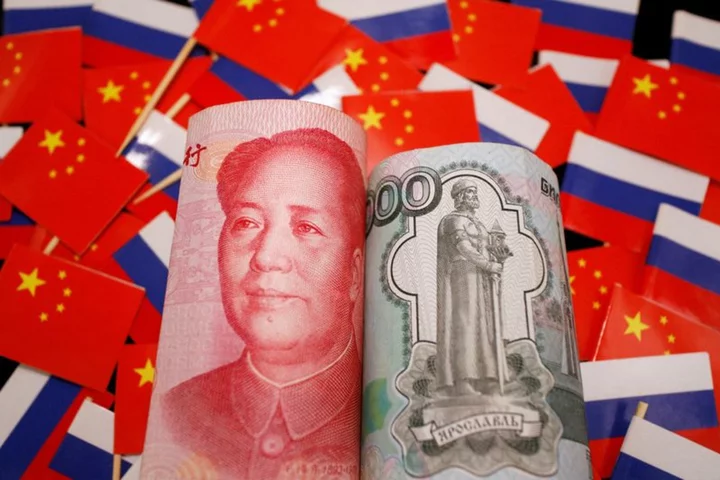China has dramatically increased use of the yuan to buy Russian commodities over the past year, with nearly all of its purchases of oil, coal and some metals now settled in the Chinese currency instead of dollars, people familiar with the matter said.
Chinese imports of major commodities from its northern neighbour totalled $88.3 billion in 2022, up 52% from 2021 as refiners, utilities and smelters snapped up discounted Russian resources after western buyers shunned the trade shortly after Moscow's invasion of Ukraine.
Following are details of China's commodities imports from Russia:
CRUDE OIL
Over half of China's crude oil imports from Russia last year at 1.73 million barrels per day (bpd) were seaborne shipments. They include ESPO blend loaded from Russia's Far East ports, a favourite grade for independent Chinese refiners, and Urals loaded from Russia's European ports.
In the first quarter of 2023, Russia leapfrogged Saudi Arabia to rank as China's top supplier, with volumes up a third to a record 2.05 million bpd, worth $13.7 billion during the quarter.
Separately, Chinese state oil major CNPC buys around 800,000 bpd of ESPO blend from Rosneft via the East Siberia-Pacific Ocean pipelines under government-to-government deals including an estimated $50 billion loans and pre-financing to Moscow.
CNPC pre-paid a significant share of the value of those contracts years ago, and has been paying fully in yuan for the supplies since mid-2022, according to two senior sources with knowledge of the matter.
Rosneft and CNPC did not respond to requests for comment.
NATURAL GAS
China has shifted to paying in yuan for piped gas imports via the Power of Siberia pipeline that began operation in late 2019. Imports last year amounted to 16 billion cubic meters, worth nearly $4 billion, a volume poised to reach 38 bcm in 2025.
China separately imported 6.5 million tonnes of Russian liquefied natural gas (LNG) last year worth $6.7 billion, which is paid in dollars as the product is not under sanction.
In addition, new gas supply is expected from Russia's Far East island of Sakhalin in coming years under a 30-year deal reached in February 2022, with annual supply reaching 10 bcm in 2026.
COAL, METALS
Ranking second in value at $12.2 billion in 2022, settlements for almost all of Chinese imports of Russian coal have shifted from dollars to yuan since the Ukraine war, according to three Chinese importers.
China, the world's top metals consumer, imported a combined $5.1 billion worth of aluminium, refined copper and refined nickel from Russia in 2022, up 16% from 2021 with import volumes heading higher so far this year.
Apart from sanctions concerns, high dollar borrowing costs and the growing use of the Chinese market for pricing metals imports have also spurred the use of yuan.
Instead of pricing off the widely used London Metals Exchange, some of the Russian imports have been priced at spot prices or at contract on the Shanghai Futures Exchange (SHFE).
"For most of the time this year, China prices are lower versus LME, thus import cost would be lower for Chinese buyers to use China prices," Lynn Zhao, a Shanghai-based commodity strategist at Macquarie.
By using renminbi, buyers also benefit from avoiding exchange risks, Zhao added.
(Reporting by Muyu Xu, Siyi Liu and Chen Aizhu; Editing by Tony Munroe and Shri Navaratnam)

